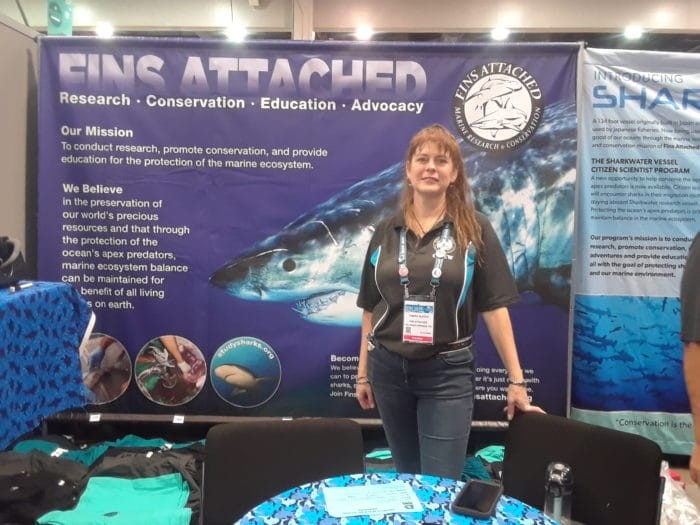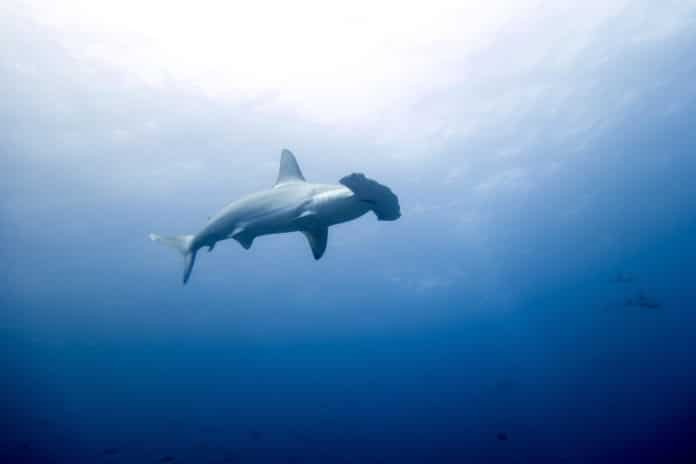Sharks are my friends almost has a rallying cry to it, but it does sum up how I feel about sharks, with a few exceptions. One of the things I really love about The Diving Equipment & Marketing Association (DEMA) show is the opportunity to talk with leaders in many fields that relate to diving. While the recent DEMA Show was a working week for me, I did have time to take in a few of the seminars and to wander around and talk with experts in fields I am interested in. Sharks and shark conservation are among them.
The topics around sharks are often controversial. Even those who are looking to conserve sharks often disagree. As an example, in the U.S. Congress is a bill, the Shark Fin Trade Elimination Act. It would make possession of most shark fins illegal in the United States. Some support it, others oppose it.
Another Bill, the Sustainable Shark Fisheries and Trade Act, is designed to promote shark fishing in a sustainable manner and require imports to meet the same standards for sustainability that United States’ fisherman must maintain. This bill does allow fins, so those who are against the fin trade are not happy with it. Finning, the act of removing the fin from a shark and disposing of the body, is already illegal in the United States.
The value of shark fins for the making of shark fin soup is the driving factors of the practice of finning. Shark fin soup, whose primary ingredient is shark fins, is a delicacy in many parts of the world, especially in Asia. Due to this demand, The market value of a shark’s fins is greater than the value of the remainder of the shark. Dozens of fins will take up less space onboard a ship than a single shark. The short-sighted approach is to just keep the fin. According to the organization shark truth:
“Shark fins can fetch up to $650 USD per kilogram. A single Whale Shark pectoral fin can sell for up to $20,000 USD and a Basking Shark pectoral fin can fetch up to $50,000 USD. In comparison, a large percentage of shark meat is undesirable or un-edible (often due to the high urea content), so it has a relatively low commercial value, netting merely $0.85 USD per kilogram. Other shark by-products like cartilage, liver oil and skin drive a very small portion of demand and are marginal in dollar value.”
Millions of sharks each year are killed for just the fins. Another sad portion of this exploitation is that culinary experts say that the fin adds no taste nor nutrients to the soup.

As such, reducing the demand for shark fin soup is often the focus of shark conservation efforts. Efforts have had some degree of success. The World Wide Fund for Nature on 8 March 2018 reported, “The volume of shark fin imported into Hong Kong has declined from 10,210 tonnes in 2007 to 4,979 tonnes in 2017, a drop of over 50 percent.” Also, it is becoming popular to eat the same soup but without the expensive fins.
Many people enjoy eating shark. There are a number of ways to catch sharks and other fish species that are sustainable. The Seafood Watch Organization has some suggestions for consumers on how to support sustainability methods.
Shark Dives
One of my most memorable dives was a shark encounter in the Florida Keys. The short version of the story is during my first dive of the day, my dive buddy kept surfacing to talk to his wife and sister who were snorkeling at the same site. During the surface interval, I told him and the dive master that if he did the same on the second dive, I would continue my dive without him. The dive site was a reef with a spur and groove formation. The spurs were only about 10 feet (ca. 3 meters) deep while the grooves were about 30 feet (ca. 9 meters). Within a few minutes of starting the second dive, my dive buddy went to the surface. Seeing he was going for another chat, I continued my dive. As I started up one of the grooves, a blacktip shark about my size swam up alongside of me. The shark stayed a few feet away but stayed just off my shoulder as I swam up the groove. When we reached the end of the groove, we turned and swam back to the open sea. We repeated that four times going up different grooves. At the last groove we dove together, he went up on the reef. It was a dive I will never forget.
Another remarkable dive was in the Bahamas at the Tongue of the Ocean. The first dive was on a reef and the second was on a wreck. On each dive, there was a couple of dozen of sharks that kept the divers company. The two dive sites were not far apart so maybe they were the same sharks, but there were many. It was amazing watching these graceful fish as they leisurely joined us. Even as I watched one shark eat a snapper out of a school of fish, there was a sense of peace.
Diving with sharks is a strong draw for divers. A study of the Florida dive industry by Oceana showed that in 2016, divers spent $221 million for shark encounters. That was just in the state of Florida. Florida is a state that has banned shark feeding.
A 2017 study published in the journal Biological Conservation found that sharks and rays contributed US$114 million to the Bahamian economy in 2014, with 99 percent of this value generated by the shark and ray tourism sector. According to the study, 19,000 divers—or 43 percent of all dive tourists visiting The Bahamas—came primarily to see sharks.
Another 2016 study showed shark diving tourism is estimated to be worth more than $25.5 million annually to Australia’s regional economy. Almost half of that amount was snorkeling with whale sharks. Whale sharks have turned poor fishing villages in the Philippines into tourist destinations.
However, divers acceptance of sharks does not reflect the general public.
Education
Here is another quote for you:
“Research by Bite-Back Shark & Marine Conservation reveals that Brits are in love with the oceans but not with sharks. While 83% think more should be done to protect the world’s oceans, 64% would prefer sharks not to exist.”
That is a very scary summary. Sharks play a very important role in the ecosystem. As the apex of the food chain, they keep those below them in check. Without sharks, the balance would change and the oceans would become a algae filled swamp. Phytoplankton would be killed off and half of the world’s oxygen is produced by phytoplankton photosynthesis.
If we want to continue to enjoy diving with sharks or even breathing in the future, we need to get the public to understand what we do. Sharks are important. There were a number of organizations at DEMA whose missions are to help educate people and to research sharks. Shark Angels and Fins Attached are but two of the organizations that I talked to who are on that mission. Fins Attached has also expanded its efforts obtaining a new research vessel the MY Sharkwater.

For our part? Support the organization of your choice and let all your family and friends know how great diving with sharks is.

